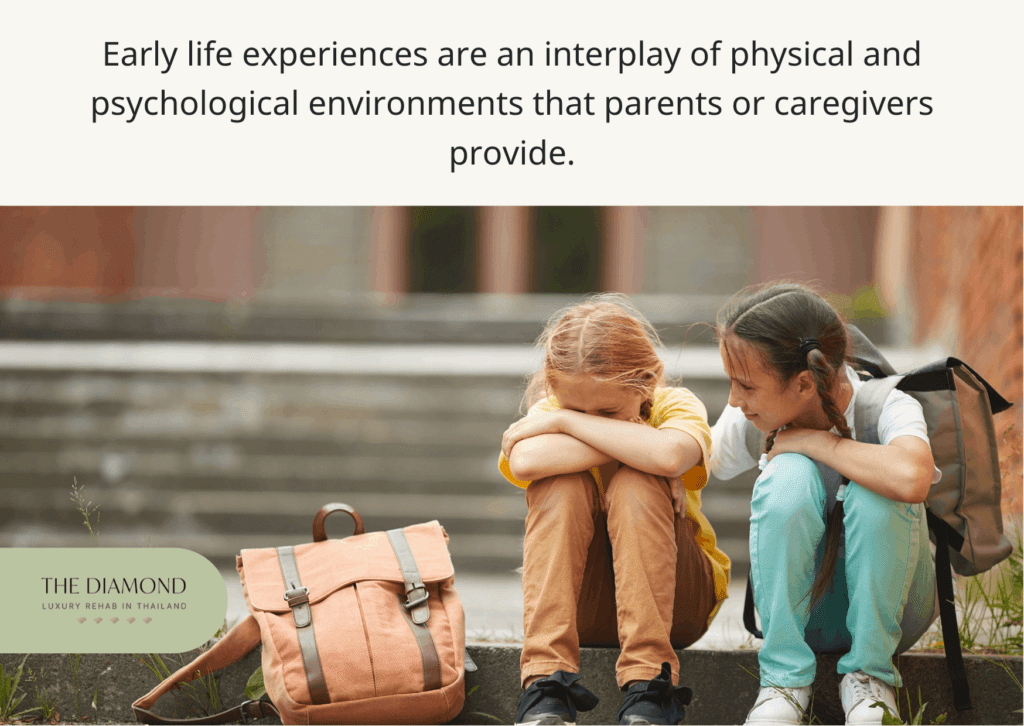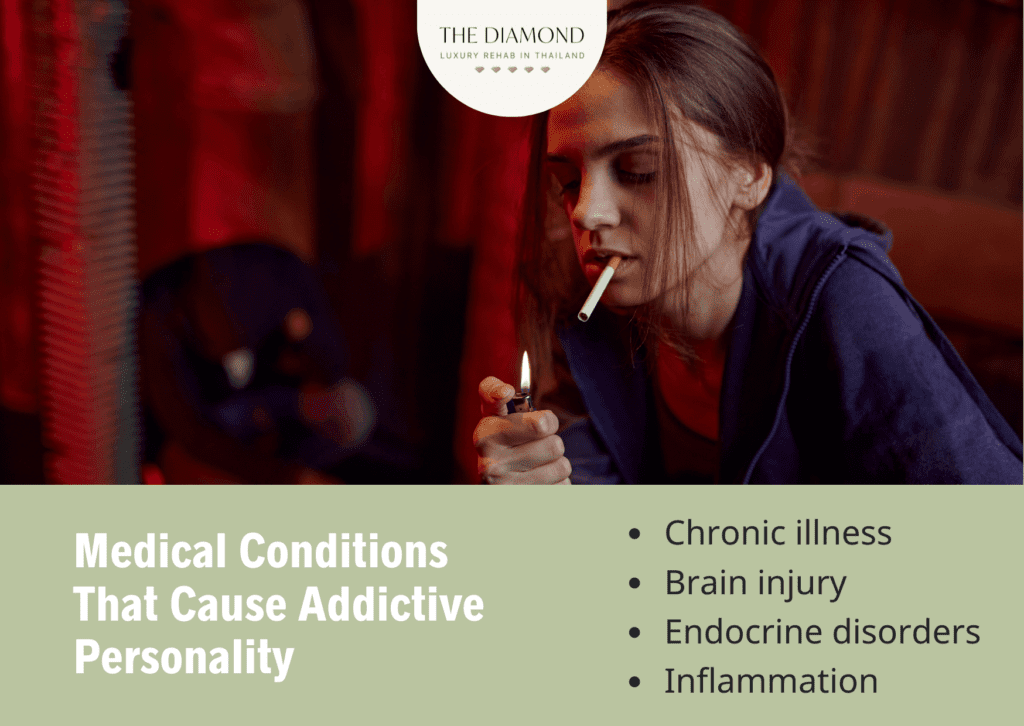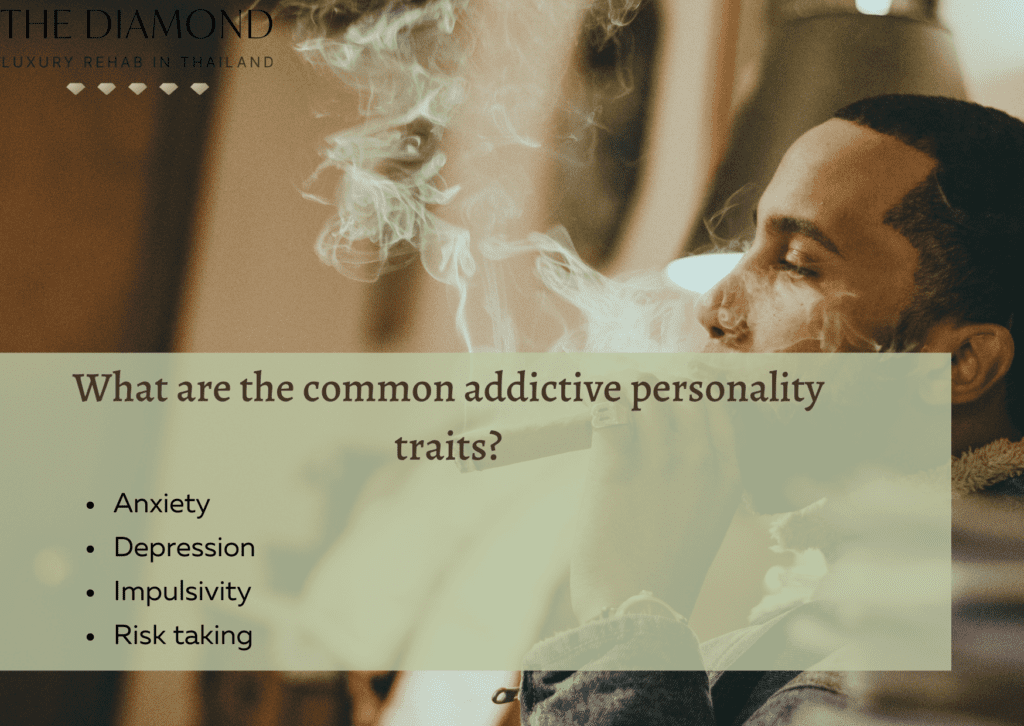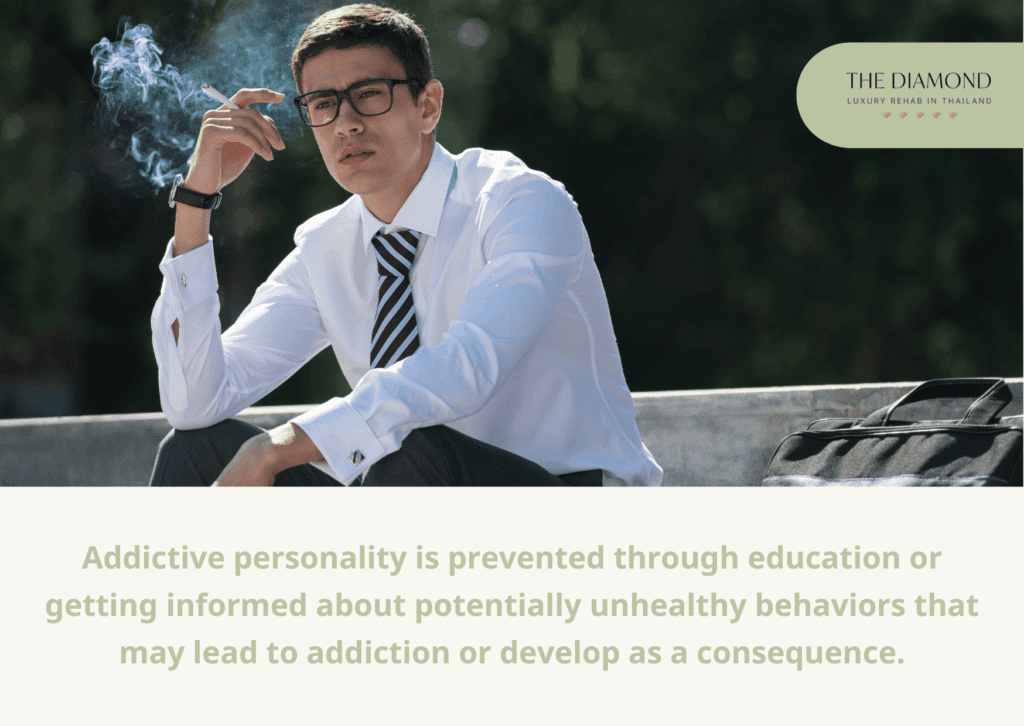Addictive personality: definition, causes, symptoms, and treatment
Table of content

An addictive personality is defined as a type of personality that is susceptible to developing an addiction. It is not a specific disorder, but a term that describes traits relating to the formation of substance use disorder or behavioral addictions. Common traits of addictive personality are anxiety, depression, impulsivity, and risk taking.
Causes of addictive personality are genetic factors, family history, early life experiences, mental health conditions, cultural and societal factors, personality traits, neurobiological factors, and environmental factors. A combination of different causes is likely to contribute to an addictive personality rather than one specific factor alone.
Symptoms and signs of an addictive personality include obsessive thoughts, problems with self-regulation, manipulative behavior, lying, secretive behavior, impulsivity, neuroticism, sensation-seeking, continuing with activities despite negative consequences, and not taking responsibility for one’s actions.
Treatment of addictive personality involves psychotherapy, family therapy, and support groups. The most common type of therapy used is cognitive-behavioral therapy. People with addictive personalities may need medications to manage the underlying conditions and problems such as depression.
What is an addictive personality?
An addictive personality is a type of personality that is more likely to develop an addiction to certain substances or behaviors. The casual term refers to a hypothesized set of traits that describe a person who is more prone to overindulging. Addictive personality is not a medical or psychiatric diagnosis, Cleveland Clinic explains, but it’s a label that helps people understand whether they have vulnerabilities associated with addiction. That’s why addictive personality is not included in the Diagnostic and Statistical Manual of Mental Disorders, Fifth Edition (DSM-5) by the American Psychiatric Association.
Despite the popularity of the term addictive personality, the concept is quite controversial due to the absence of consistent evidence surrounding this subject, according to Very Well Mind. At the same time, Medical News Today explains that considering addiction to be a part of a person’s character could lead people to assume it’s part of who they are or that addiction is entirely their fault. While personality is not the only factor in the development of addiction, it’s useful to learn the connection between certain traits and addictive behaviors or substance use disorders.
The concept of an addictive personality isn’t a modern-day invention. For example, a paper “The Mystery of Addiction” published in the December 1999 issue of The Lancet, and written by Prof. David F. Musto from the University of Washington, Seattle revealed during past decades (which would imply the late 1900s), the biology of addiction was widely explored. Potential explanations for the development of addiction ranged from the presence of an addictive personality to the invincible influence of drugs.
In the first two versions of the Diagnostic and Statistical Manual of Mental Disorders (DSM-1 and DSM-2, published in 1952 and 1968 respectively) by the American Psychiatric Association addiction was stigmatized by being listed with societally disapproved disorders stemming from personality disorder, according to a paper by P.E. Nathan et al. in the December 2016 issue of Annual Review of Clinical Psychology. This implies that addiction was believed to have a connection with certain aspects of personality even then.
How common is addictive personality?
Addictive personality is more common than initially thought, it is present in 10% to 15% of the population, according to a March 2009 post on Psychology Today. Around 18% of addicts have a personality disorder indicated by stealing, lying, manipulative social behavior, and lack of conscience, reported in a post on addictive personality by Scientific American in April 2016.
As of 2023, statistics regarding addictive personality and its prevalence are scarce. However, research on addictive personality traits such as impulsivity, depression, and anxiety shows this type of personality is quite common.
Anxiety, as a type of addictive personality trait, is present in 31.1% of the U.S. adults in their lifetime, according to the National Institute of Mental Health. Additionally, National Alliance on Mental Illness (NAMI) reports that 19.1% or 40 million U.S. adults have an anxiety disorder.
Impulsivity, an addictive personality trait, is present in 16.9% of the general population, according to a study by J. Chamorro et al. in the August 2012 issue of the Journal of Psychiatric Research. This type of addictive personality was more prevalent in men than women.
Depression, an addictive personality trait, is present in 4.7% of U.S. adults. Mayo Clinic confirms that women are twice as likely as men to have depression. The prevalence of depression among adolescents jumped from 8.1% in 2009 to 15.8% in 2019, according to a paper that Michael Daly, MD published in the March 2002 issue of the Journal of Adolescent Health. About 1% to 5% of elderly adults living in the community have depression, CDC reported.
What are the causes of addictive personality?

The causes of addictive personality are listed below:
- Genetic factors
- Family history
- Early life experiences
- Mental health conditions
- Cultural and societal factors
- Personality traits
- Neurobiological factors
- Environmental factors
1. Genetic factors
Genetic factors are the role of genetics in the development of a physical or mental condition. Genetics is the science of the heredity of specific traits that are passed on from one generation to another by means of genes. Genetic factors contribute to the development of physical and mental illnesses. They also play a role in the formation of an addictive personality.
Examples of genetic factors are inheriting genes or their mutations from a parent, which include genes that determine eye or hair color, and cause birth defects, cancers, and illnesses.
Genetic factors become a cause of addictive personality because a person can inherit specific traits from their parents. In a paper from the March 2018 issue of Genes, Brain, and Behavior, S. Sanchez-Roige et al. reported that personality traits are moderately inheritable and may predict lifetime outcomes including psychopathology. As per the study, personality traits are polygenic (involve multiple genes) and are influenced by common alleles of small effect, but their effect sizes on molecular phenotypes can be significant. Gene variations involving dopaminergic and serotonergic systems could be involved, but this subject requires further research. Dopamine and serotonin are neurotransmitters that regulate moods, emotions, and behaviors.
Additionally, a paper by R.A. Power and M. Pluess in the July 2015 issue of Translational Psychiatry confirmed that personality traits have a genetic component. That means a person can inherit personality traits through genes or genetic variations from a parent. For that reason, they may develop an addictive personality. People can have a genetic predisposition to addiction as well, according to a paper that F. Ducci and D. Goldman published in the June 2012 issue of The Psychiatric Clinics of North America.
2. Family history
Family history is a past occurrence of a physical or mental illness in family members. The major role in the onset of physical or mental diseases belongs to family history. It can contribute to the formation of an addictive personality too.
Examples of family history are physical and mental illnesses that tend to run in families such as asthma, diabetes, heart disease, depression, schizophrenia, or bipolar disorder.
Family history becomes a cause of addictive personality because a person can learn or “pick up on” behaviors from their family members. Human personality and temperament are shaped by genetics and people or situations in life. Children grow up absorbing the behaviors of people around them, primarily their family. They start imitating those behaviors.
In their paper from the January 2023 issue of Infant and Child Development, A.J. Wright and J.J. Jackson explained that parents’ personalities influence the outcomes of children while they navigate through adolescence. Specific behaviors such as anxiety also tend to run in families, as per a paper by K.A. McLaughlin et al. in the July 2008 issue of the Journal of Clinical Psychology.
3. Early life experiences

Early life experiences are an interplay of physical and psychological environments that parents or caregivers provide. A person’s childhood has a significant influence on the development of psychological illnesses. It plays a role in addictive personality as well.
Examples of early life experiences are positive and negative events in childhood such as having fun with friends or family, feeling supported and loved, death of a loved one, divorce or separation, the lack of parental affection, good/bad family communication, and growing up in a functional/dysfunctional home.
Early life experiences become a cause of addictive personality because childhood has a major influence on personality development and behaviors. In their paper from the March 2018 issue of Frontiers in Psychology, A. Castho, and B. Birkas revealed that unpredictability and harshness in early life lead to the development of personality traits associated with instability in social relationships. Detrimental childhood experiences affect personality development and result in a malicious interpersonal style. According to the same paper, childhood adversity causes personality dysfunctions due to negative effects on socio-cognitive and emotional functioning.
A person who was raised in an unstable environment may develop an addictive personality because those negative experiences shaped them and impaired their ability to process their emotions in a healthy manner. Traumatic early life experiences impair a person’s stress response, influence their temperament, and may pave the way to an addictive personality and addiction.
4. Mental health conditions
Mental health conditions are clinically significant disturbances in cognition, emotion regulation, and behavior of an individual. They have a huge impact on a person’s functioning and quality of life. Mental health conditions can contribute to the formation of an addictive personality.
Examples of mental health conditions include anxiety disorders, depression, bipolar disorder, schizophrenia, eating disorders, personality disorders, disruptive behavior and dissocial disorders, and neurodevelopmental disorders such as ADHD and autism spectrum disorder.
Mental health conditions become a cause of addictive personality because they influence the way a person processes emotions and deals with the world around them. Suffering from a mental illness could exhibit a lasting effect on the way a person thinks, feels, and relates to others. More precisely, mental illness can lead to an alteration in personality functioning. According to a paper “Personality and Psychopathology” from the June 2011 issue of World Psychiatry, the changes in personality in these situations are called “scars” of a mental disorder.
The same paper reveals a person with a serious mental disorder can develop new personality traits due to their experience of psychopathology. While this research isn’t specific to addictive personality; it is still a solid piece of evidence confirming that mental health conditions can cause changes in one’s character. That’s why a person may develop an addictive personality too.
It’s also useful to mention that mental illnesses contribute to the development of addiction because they may amplify the rewarding effects of substances. Mental illnesses have a significant impact on personality and one’s likelihood of developing addiction.
5. Cultural and societal factors
Cultural and societal factors are influences of a specific society and culture in the development of mental illness. They can play a role in the onset of an addictive personality.
Examples of cultural and societal factors are social classes, attitudes, demographics, values, religion and beliefs, education, and lifestyle.
Cultural and societal factors become a cause of addictive personality because culture and society can shape a person’s values and behaviors. Cultures can place different values on specific traits and what is considered positive or negative. Repeated exposure to trends in society and a desire to fit in may result in adopting specific personality traits and behaviors. For that reason, a person may adopt an addictive personality if the use of certain substances is socially and culturally accepted. Also, cultural and societal factors may involve a lot of stressors including social isolation or discrimination in minorities. These stressors could lead to changes in personality and cause addictive characteristics in a person. Culture and society shape a person’s expectations in life and thereby influence the development of specific traits.
6. Personality traits

Personality traits represent characteristic patterns of thoughts, behaviors, and feelings of an individual. Every person has their own personality traits that describe who they are. Personality traits are a major component of an addictive personality.
Examples of personality traits are introversion, extraversion, optimism, pessimism, self-confidence, loyalty, curiosity, humility, empathy, intelligence, ambition, selfishness, compassion, independence, enthusiasm, and neuroticism.
Personality traits become a cause of addictive personality because certain characteristics affect mental well-being and emotional functioning thereby causing specific addictive traits. For example, people with neuroticism are more prone to anxiety, which is a major addictive personality trait. At the same time, low conscientiousness and neuroticism may lead to another addictive personality – depression. These personality traits are associated with a lack of organization in life, which may increase stress levels and contribute to depression.
According to a review by D.N. Klein et al. in the July 2011 issue of Annual Review of Clinical Psychology, personality traits can predict and influence the course and treatment of depression, and multiple mechanisms are involved. Good examples of these mechanisms are factors that contribute to depression and personality traits because they form a vicious cycle. In the vicious cycle, personality traits may contribute to depression, but depression can also contribute to the development of certain personality traits associated with addiction.
Moreover, traits such as sensation seeking or lack of planning could lead to impulsivity, yet another important type of addictive personality.
7. Neurobiological factors
Neurobiological factors are effects of the brain’s functioning in the development of physical or mental illnesses. The brain’s functioning can affect people’s well-being, emotions, and behaviors. It also contributes to the development of an addictive personality.
Examples of neurobiological factors are structural brain changes and imbalances of neurotransmitters such as serotonin and dopamine.
Neurobiological factors become a cause of addictive personality because changes in the brain’s structure and function could influence personality traits. For example, J.A. Foster and G. MacQueen revealed in their review from the January 2008 issue of the Canadian Journal of Psychiatry that there is a neurobiological relationship between personality and depression, a form of addictive personality. The relationship involves several mechanisms including alterations in hypothalamic-pituitary-adrenal (HPA) axis function and brain areas such as the hippocampus.
Impulsivity is also a good example of an addictive personality where neurobiological factors are involved. According to a paper by K. Kozak et al. in the October 2018 issue of Annals of the New York Academy of Sciences, impulsivity includes neurobiological systems such as the regulatory system, reward system, and threat system. Sensation-seeking is associated with activation in brain areas involved in arousal, motivation, and reinforcement.
Imbalances in levels of neurotransmitters can also pave the way to an addictive personality. A good example is a personality trait such as depression, which is associated with low serotonin. Impulsivity is connected to dopamine, a neurotransmitter involved in reward and learning.
8. Environmental factors
Environmental factors are circumstances that affect a person’s exposure to stressors or influence their mental health and well-being. An individual’s environment has a big part in every aspect of their life, which also implies the onset of an addictive personality.
Examples of environmental factors are exposure to toxins and chemicals, smoking, substance abuse, air pollution, extreme weather conditions, sleep deprivation, and social circle.
Environmental factors become a cause of addictive personality because the environment plays a major role in the development of personality and the way people handle stress or cope with emotions. An individual’s upbringing, life experiences, lifestyle, and social circle influence their personality in a way that a harmonious environment contributes to a more positive or calm disposition. An environment that is in disarray does the opposite – it emphasizes negative personality traits and behaviors such as risk-taking or being impulsive. Negative interactions with the environment and one’s social circle can pave the way to depression and contribute to an addictive personality, too. Negative influences of the environment may result in social isolation, which can affect mental health and also influence the personality of an individual.
What are the medical conditions that can cause an addictive personality?

Medical conditions that can cause addictive personality are listed below:
- Chronic illness: Heart disease, diabetes, cancers, HIV, thyroid conditions, and other chronic illnesses can affect mental health and lead to depressed feelings. People with chronic illnesses are depressed due to the symptoms they experience and the limitations those diseases impose on their lives. Chronic illnesses may cause anxiety as well. Both depression and anxiety are associated with an addictive personality.
- Brain injury: A person who sustains brain injury may develop problems with disinhibition and impulse control. According to a study by C. Vonder Haar et al. in the October 2017 issue of the Journal of Neurotrauma, traumatic brain injury is associated with an increase in impulsive decision-making. Possible mechanisms of action are tissue loss and inflammation. Impulsivity is associated with addictive personality traits.
- Endocrine disorders: Endocrine (hormonal) diseases are associated with psychiatric conditions, according to a paper by J. Salvador et al. in the March 2019 issue of Endocrinology and Systemic Diseases. That means hormonal imbalances affect emotions and behaviors, which could explain their impact on personality. A good example is the thyroid gland; an imbalance of thyroid hormones strongly affects a person’s behavior and may cause problems such as depression. This could pave the way to an addictive personality and increase the risk of addiction.
- Inflammation: An inflammatory state changes thinking patterns, mood, and decision-making because it makes a person respond to the world in an impatient and more reactive manner, according to a February 2020 post by Austin Perlmutter MD on Psychology Today. Chronic inflammation wreaks havoc on physical and mental health. It can also contribute to depression. For that reason, inflammation can affect personality and behavior and contribute to addictive traits.
What are the symptoms of an addictive personality?
The symptoms of an addictive personality are listed below:
- Obsessing
- Always wanting more
- Lying
- Manipulative behavior
- Risky behaviors such as criminal tendencies
- Continuing with actions despite negative outcomes
- Impulsive behavior
- Not taking responsibility for one’s actions
- Inability to maintain healthy relationships
- Sensation-seeking behavior
- Neuroticism
- Secretive behavior
What are addictive personality complications?
Addictive personality complications are listed below:
- Financial problems: impulsivity and problems self-regulating may lead to overspending and financial problems along the way.
- Legal troubles: An individual with an addictive personality is prone to risk-taking, sensation-seeking behavior which may also include criminal activities. As a result, they may get into legal trouble.
- Injury risk: Due to their risk-taking nature and constant need to try new experiences, people with addictive personalities carry a higher risk of injury. Their impulsivity can increase the risk of injury as well due to poor decision-making and engaging in reckless activities.
- Work/school problems: impulsivity, obsessive thoughts, and symptoms such as failing to take responsibility can create a lot of problems at work or school. An affected person fails to complete their tasks and may not get along with their colleagues, which significantly impairs their performance and productivity. In most severe cases they may lose their job. Unemployment can contribute to other complications such as financial problems.
- Self-consciousness: traits such as neuroticism make a person insecure and self-conscious. The problem with self-consciousness is that it leads to low self-esteem and contributes to or worsens depression.
- Social withdrawal: People with addictive traits tend to be disconnected, cautious, secretive, and neurotic all of which may pave the way to social isolation. Social isolation can worsen addictive personality traits and may contribute to the development and progression of addiction. In their paper from the September 2014 issue of the International Journal of High Risk Behaviors and Addiction, M. Hosseinbor et al. suggested that the social and emotional feeling of loneliness is a major risk factor for the initiation of drug abuse and its maintenance.
- Suicidal tendencies: traits such as impulsivity and depressive behaviors can lead to severe consequences such as suicidal tendencies. A paper by Y. Gvion et al. in the September 2015 issue of the World Journal of Psychiatry confirmed that impulsivity is a risk factor for suicidal behavior. People with addictive personalities may develop traits and behaviors that endanger their well-being and increase suicide risk.
What are the common addictive personality traits?

Common addictive personality traits are listed below:
- Anxiety
- Depression
- Impulsivity
- Risk taking
1. Anxiety
Anxiety is an emotion indicated by feelings of worry, tension, or fear about situations or events that are already happening or may happen in the future. Everyone experiences anxiety from time to time when dealing with negative stimuli. Anxiety is temporary, but it’s also possible for people to experience persistent anxiety, which indicates the presence of an anxiety disorder.
Anxiety becomes a personality trait of addictive personality because it can impair how people process their emotions, behave, and understand the world around them. Symptoms of anxiety can be quite intense. In an attempt to feel better and relieve the severity of those symptoms, a person may start developing unhealthy coping mechanisms. For instance, they may obsess over specific thoughts or engage in risky behaviors such as substance abuse. The inability to process emotions leads to adopting addictive personality traits.
Anxiety disorders showed the strongest link with neuroticism, according to a paper that J. Ormel et al. published in the July 2013 issue of Clinical Psychology Review. As mentioned above, neuroticism is a symptom of an addictive personality. Anxiety could make a person neurotic due to dysfunctional or rigid responses to negative and stressful situations in an attempt to gain a sense of control. Anxiety is an addictive personality trait because unhealthy reactions to stress and negative stimuli lead to adopting unwise habits and making wrong choices.
2. Depression
Depression is a mood disorder indicated by persistent feelings of sadness and loss of interest that interfere with a person’s quality of life. People with depression tend to feel hopeless or worthless. Depression affects physical health and wellbeing, since it contributes to problems such as insomnia and weight gain.
Depression becomes a personality trait of addictive personality because it contributes to the atrophy of neurons in the cortical and limbic brain areas, which regulate mood and emotion. More precisely, depression may influence brain functions and change the way people feel, think, or behave. According to a paper by I. Radulescu et al. in the August 2021 issue of Experimental and Therapeutic Medicine, hippocampus of depressive patients is smaller compared to that of healthy individuals. Since the hippocampus regulates memory and is in charge of complex cognitive processes, reduced grey matter volume in this region is linked to negative emotions and impaired cognition. Depression is also associated with impaired structure and function of other brain regions including the thalamus, and prefrontal cortex, all of which help control moods and behaviors too. It’s also useful to mention that depression is indicated by low levels of serotonin, a neurotransmitter that regulates many functions including emotions and moods.
Depression may cause the development of unhealthy traits such as impulsivity as means of self-medication. A person starts adopting certain traits to cope with their symptoms. This can lead to the development of an addictive personality. A useful thing to mention is that depression also increases the risk of substance abuse and addiction.
3. Impulsivity

Impulsivity is defined as the tendency to act without thinking i.e. without planning or forethought. People with impulsivity tend to make hasty decisions or get into arguments and engage in risky behaviors. Impulsivity is a type of behavior, not a mental disorder.
Impulsivity becomes a personality trait of an addictive personality because it negatively affects self-regulation. An impulsive person can’t control their urges or impulses very well. They may engage in risky behaviors and make wrong choices because they can’t control themselves. At the same time, a person keeps repeating those behaviors despite negative consequences. Impulsivity robs a person of analytical nature and thorough planning; they act on a whim which may lead to dangerous choices such as engaging in substance abuse or addictive behaviors such as gambling.
In May 2014, Boston University Chobanian & Avedisian School of Medicine reported that impulsivity could lead to behavioral addictions such as eating disorders due to cellular activities in the brain area involved with reward. That means the brain changes resulting from impulsivity could affect how people act. They make it difficult to control oneself or regulate behavior, which could result in addictive personality traits. Impulsivity is associated with many symptoms of addictive personality including lack of self-regulation, sensation-seeking, and neuroticism.
4. Risk taking
Risk taking is a behavior pattern indicated by unnecessarily engaging in activities that are uncertain or potentially dangerous. It isn’t a disorder, but it is part of mental conditions such as impulse control disorder.
Risk taking behavior becomes a personality trait of an addictive personality due to a person’s desire to try new experiences and feel a sense of thrill and excitement. Thrill-seeking behavior leads to making wrong decisions and engaging in addictive behaviors such as drug abuse or gambling. Risk taking is strongly associated with addiction itself. A paper that K.N. Balogh et al. published in the March 2013 issue of the Journal of Behavioral Addictions confirmed that disadvantageous decision making and increased risk taking pave the way to problematic behaviors such as addictions. These effects occur due to changes in the brain associated with cognitive, emotional, and motivational processing. More precisely, risk taking is connected to brain changes that affect how people think and act, which could involve developing addictive personality traits.
Other traits of an addictive personality may cause risk taking behavior. Good examples are anxiety and depression. People with mental conditions such as anxiety and depression can’t achieve normal dopamine levels in a healthy way, so they may engage in risk taking behaviors to achieve that effect. This can lead to the need to participate in problematic behaviors that lead to addiction.
What are the risk factors for an addictive personality?
Risk factors for an addictive personality are listed below:
- Genetic predisposition or having a family member with specific personality traits
- Trauma
- Mental illness such as PTSD, depression, or bipolar disorder
- Love of excitement or being passionate about adrenaline-boosting activities
- Inability to stop doing certain things or engaging in activities
- Low self-esteem
How is addictive personality diagnosed?

Addictive personality is diagnosed through psychiatric assessment. Keep in mind that addictive personality is not a mental illness, which is why there is no official diagnosis or diagnostic criteria. A healthcare professional such as a psychologist or psychiatrist may determine the presence of addictive personality traits through psychological evaluation which involves a conversation with a patient or completing a questionnaire. Additionally, the healthcare professional may diagnose anxiety and depression, which are types of addictive personality traits.
Addictive personality is mainly diagnosed through the presence of specific signs and traits. These include anxiety, depression, impulsivity, and risk-taking behavior. Traits such as anxiety and depression are diagnosed through diagnostic criteria from DSM-5. In order to be diagnosed with depression or anxiety, a person needs to experience certain symptoms including sadness, loss of interest, low mood, sleep problems, or social withdrawal during a specific timeframe such as at least two weeks.
Where can you seek an addictive personality diagnosis?
You can seek addictive personality diagnosis in clinics, hospitals, rehab centers, or non-profit organizations that offer support and help to people with substance abuse or high-risk individuals. Keep in mind that an addictive personality is not a specific mental illness with its own diagnosis. However, it is possible to schedule an appointment and speak with a professional who understands addictive personality and its traits. They will recommend the best approach so that a person doesn’t develop addiction just because they have an addictive personality.
What are the treatments available for addictive personality?
The treatments available for addictive personality are listed below:
- Psychotherapy: helps people to overcome emotional challenges and mental health conditions. Therapy is the first-line approach for people who want to change their personality traits or behaviors. The most common type of therapy performed is cognitive-behavioral therapy (CBT). Cognitive-behavioral therapy is a type of talk therapy that helps people manage their problems by changing the way they think or behave. CBT helps to treat addictive personality because it encourages a patient to identify irrational thoughts that lead to negative emotions and behaviors. Once a patient identifies those thoughts, they learn skills to change them into more realistic or positive alternatives. When people rationalize their thinking patterns, they gain more control over their behavior. This can help people with depression, anxiety, and impulsivity, all of which are addictive personality traits. CBT is an effective approach and it can help reduce impulsivity by improving self-control, according to a review that T. Smith et al. published in the July 2019 issue of the Journal of Experimental Psychology : Animal Learning and Cognition. Moreover, a study by A.K. Matusiewicz et al. in the September 2010 issue of The Psychiatric Clinics of North America showed CBT is effective for treating personality disorders. That means this kind of therapy can, indeed, modify personality traits and give hope to people with an addictive personality. People generally need six to 20 sessions that last 30 to 60 minutes.
- Family therapy: gives opportunity to family members to resolve conflicts and improve communication. It helps to treat addictive personality because many traits that people develop are influenced by their environment, especially family. Family therapy provides more structure and helps people process negative emotions caused by negative events from their childhood or family rifts. As they resolve conflicts and improve the consequences of dysfunctional family dynamics, people can successfully manage traits associated with an addictive personality. Family therapy is an effective approach and it can aid the management of substance abuse by improving family functioning, according to a paper by J. Esteban et al. in the March 2023 issue of Family Process. Also, L. Jimenez et al. showed in their paper from the April 2019 issue of the International Journal of Environmental Research and Public Health that family therapy helps with mental health conditions. This is particularly important because mental illnesses contribute to the development of an addictive personality. Family therapy is short-term and usually involves 12 sessions that are up to 50 minutes in duration.
- Support groups: a gathering of people with the same problems to share their experiences and receive support from peers. Support groups help to treat addictive personalities because people understand they’re not alone. People in support groups share their stories and talk about their challenges, which fellow members find relatable. Support groups are meant for giving and receiving support on the journey to change negative personality traits. These groups are effective in managing addictive personality. While studies on addictive personality specifically are lacking, available evidence confirms that support groups could help people with personality disorders, as per a study that S. Gillard et al. published in the March 2015 issue of Psychology and Psychotherapy. That means support groups can truly help people make major personality changes. Support groups can increase confidence and motivate people to make positive changes. There is no specific duration of this approach, people may attend the sessions regularly for months and years.
How is addictive personality prevented?

Addictive personality is prevented through education or getting informed about potentially unhealthy behaviors that may lead to addiction or develop as a consequence.
Avoid people or places that emphasize impulsivity. Since impulsivity is a major aspect of an addictive personality, it is necessary to tone it down. Spending time with people who are impulsive or being in a place that encourages impulsivity can worsen impulsive behaviors and lead to an addictive personality. For that reason, it is useful to avoid spending time in a social circle where this personality trait is encouraged.
Seek help for mental illness. Mental conditions such as anxiety and depression contribute to the development of an addictive personality, especially when left untreated. Make sure to seek help from a psychiatrist or psychologist and support from loved ones.
Change habits. People with addictive personalities are risk-takers or thrill seekers. Their risk-taking trait may lead to potentially dangerous actions. Find a safer and healthier activity to do regularly to minimize the risk of participating in actions that lead to an addictive personality. Good examples are regular exercise or playing sports.
Follow a healthy lifestyle. Adhering to a healthy lifestyle is beneficial for physical and mental health alike.
Manage stress in a healthy manner. Healthy stress management techniques prevent risky activities or personality traits. Good examples are deep breathing, yoga, meditation, mindfulness, acupuncture, reading, writing, or exercising.
What coping strategies help individuals with addictive personalities?
Coping strategies that help individuals with addictive personalities include practicing self-help, socializing without alcohol, building strong relationships, improving confidence, and managing stress.
Self-care is necessary for optimal physical and mental health alike. It involves eating a well-balanced diet, exercising regularly, and getting enough sleep.
Socializing without alcohol shows that a person doesn’t have to be intoxicated to have a good time. Avoiding alcohol (as well as cannabis and drugs) reduces the likelihood of impulsive and risky behaviors associated with an addictive personality.
Building strong relationships is beneficial to mental health. To overcome their problems and change certain personality traits, people need a strong support system.
Improving confidence is a necessary step to cope with an addictive personality because a person may avoid overcompensating for low self-esteem by engaging in risky behaviors. People with depression, which is an important trait of addictive personality, tend to have low self-esteem. Working on boosting confidence can aid depression management and thereby help a person cope with an addictive personality.
Other coping strategies for an addictive personality include limiting screen time, thinking positively, and talking with loved ones about problems that are troubling you.
What professional help is available for addictive personalities?

Professional help available for addictive personalities includes sessions with a psychotherapist or psychologist. Regular sessions help people overcome the challenges of an addictive personality. This type of professional help is available in hospitals, clinics, and rehab centers. The latter is particularly important for people who have already received treatment for addiction and need more structure or support to overcome addictive personality.
Is a medication used to treat addictive personalities?
Yes, medication is used to treat addictive personalities. They are not the first-line treatment and the specific medication for addictive personality doesn’t exist. However, a healthcare professional may prescribe medications to treat specific aspects of an addictive personality such as antidepressants for depression or anti-anxiety medications for anxiety.
The most commonly prescribed antidepressants are selective serotonin reuptake inhibitors (SSRIs) which work by blocking (inhibiting) the cells from absorbing serotonin thereby increasing levels of this neurotransmitter in the brain. In a paper that S.S. Clevenger et al. published in the January 2018 issue of the Therapeutic Advances in Psychopharmacology, SSRIs were described as the most effective antidepressants for people with depression. Antidepressants are also prescribed to manage anxiety and may help with neuroticism.
Antidepressants start working in two to four weeks; that’s when patients experience certain benefits. However, it may take up to eight weeks to experience the full effects.
Can residential treatment programs help addictive personalities?
Yes, residential treatment programs can help addictive personalities. Residential programs make it possible for patients to work on their recovery in a supportive and well-structured environment.
Residential treatment programs are most useful for people with severe forms of addictive personality i.e. individuals with severe anxiety or depression. They are helpful for people who are at a high risk of harming themselves due to dangerous activities in which they engage.
Residential treatment programs are beneficial for people with a history of addiction. Persons who recovered from addiction may want to work on overcoming their addictive personality so that they prevent future problems with substance abuse. In these cases residential programs are practical. Duration of residential treatment programs is usually 30, 60, or 90 days.

